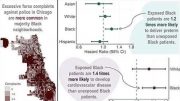The impact of the COVID-19 epidemic on Black and Latinx health-care support workers.
During the COVID-19 pandemic, a Rutgers study sheds new light on the experiences and viewpoints of Black and Latinx people working in supportive health care jobs.
The research is the first to focus on the pandemic’s impact on support health care professionals from marginalized populations. While nurses and physicians are the most well-known frontline workers, other professions in healthcare, such as certified nursing assistants, therapists, emergency medical service professionals, food services, and cleaning staff, are often overlooked and underpaid. Nearly 7 million people make up this vital workforce, the majority of them are Black and Latinx women who live in the communities they serve.
The findings, published in PLOS ONE, can be utilized to build public health messaging and policies.
In four counties in New Jersey with high incidence of COVID-19 infections and deaths, researchers interviewed 17 Black or Latinx women working in support health care jobs in hospitals, nursing homes, and home care settings.
According to the findings of the study:
Their professional obligations and roles were affected by the pandemic. Changes in employment responsibilities, increasing hours, and learning new technologies were among the concerns, as were changes in safety protocol and a lack of personal protective equipment.
They had testing irregularities; some participants said they were tested frequently, while others said they were not forced to take tests. Many people took on the task of self-testing in order to keep their family secure.
Participants were filled with anxiety and panic, including fears of getting COVID-19 and spreading it to their family, as well as losing their jobs or a chunk of their income. They were also concerned about telling their employers about potential exposure and the accompanying stigma among coworkers if they tested positive.
Their vaccine skepticism and decisions evolved over time. Initial concerns included concerns about vaccine side effects, trial findings, and experiences with failed public health interventions in minority populations.
Those who were formerly anti-vaccine claimed their opinions changed after watching coworkers get vaccinated and learning about vaccines from trustworthy sources. Vaccine requirements and their implications for current work were also a subject of concern among those who took part in the study.
«Our findings highlight the critical need for health systems to devote resources to improving the work conditions for this marginalized workforce, including offering resources that support resilience as well as addressing wages, physical and mental demands, health, safety, and well-being to retain them in their roles,» said first author Zorimar Rivera-Nez, an assistant professor at Rutgers School of Public Health.
«Transparent discussion by trusted entities or persons directly addressing questions and concerns regarding the COVID-19 vaccination may help to increase the number of immunized individuals within this workforce.»
The research was carried out as part of NJ HEROES TOO (New Jersey Healthcare Essential Worker Outreach and Education Study—Testing Overlooked Occupations), which was funded by the National Institutes of Health’s Rapid Acceleration of Diagnostics for Underserved Populations (RADx-UP) Initiative in collaboration with 18 community-based organizations and four health-care organizations.






Be the first to comment on "The impact of the COVID-19 epidemic on Black and Latinx health-care…"